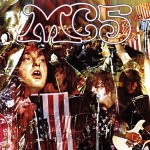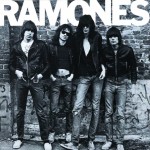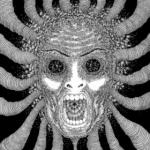Iggy and the Stooges : Raw Power

Even though I was born in the early seventies, there was a time when I didn’t know all that much about seventies music. I didn’t know Pere Ubu from Black Uhuru, Led Zeppelin from Iron Butterfly, nor was I at all versed in anything resembling punk. I went on with my life, oblivious to some of the best music recorded, racking up albums in the eighties and nineties, hearing the bands influenced by those before them, but never the progenitors. I followed the usual backtracking techniques that most people employ, finding the Stooges in a roundabout way through Nirvana, David Bowie and the Ramones. Raw Power was the first Stooges album I owned. I was introduced to “the world’s forgotten boy” that day, and discovered one of the most dynamic figures in rock and roll history.
The Stooges‘ two previous albums, the eponymous debut and the critically acclaimed Fun House, were hugely influential albums and the reigning opinion on the advent of proto-punk. The band broke up only to be urged to reunite at the behest of one David Bowie, who mixed what was to become both a controversial and, in my opinion, more influential album, Raw Power. With the album came a name change, Iggy taking top billing over the rest of the Stooges now featuring James Williamson on guitar with Ron Asheton moving to bass after the death of Dave Alexander. Pop actually produced the album, but Bowie’s handling of the mix caused a stir as every instrument was made to sound thin and tinny. To this day, even after the remastering by Pop, many music aficionados still consider the drums to be too understated. Even with its flaws, Raw Power is one of the most aggressive albums ever put to vinyl, tape or CD.
“Search And Destroy” is one of the more famous album openers of the seventies. To begin an album so strong usually means that the rest of the album is secondary to the opener, usually a single. For Raw Power, as most people who own it know, this is not the case. Take “Gimme Danger,” a song in which Pop trades in the raspy screams for a crooning baritone. The music in the song is like a precursor to Neil Young’s “Rockin’ in the Free World,” a tune and artist often credited with being the godfather of grunge. Then take the guitar riff of “Penetration,” which resembles some of the guitar work found in songs by Motley Crue and other hair / glam bands of the early eighties (Interesting Note #1: Iron Maiden’s Bruce Dickinson was the executive producer for the reissue!). “I Need Somebody,” the Detroit blues number could easily be seen as an influence for many Detroit bands to come including the punk / blues duo the White Stripes. Throw in the fact that the Ramones were directly influenced by the Stooges, and you have four entire genres that can be traced back to the band! Does this mean that Iggy is the great grandfather of modern rock and roll? I would argue that yes, Iggy & the Stooges are probably one of the most influential bands in history.
Sinewy Iggy, silver haired, low slung leather pants to show off his abs, was the poster boy, and still somewhat is, for rockstar heroin chic. After the release of Raw Power, The Stooges broke up again, drug problems nearly ruining the lives of everyone involved, especially Iggy, who checked into rehab to kick the “needle and the damage done.” It would be four years later that Pop would hook up once again with Bowie and record his two huge solo albums in one year, The Idiot and Lust for Life. (Interesting note: The Idiot is now famous for being both the album that sparked Ian Curtis and Bernard Sumner in their first jam session and then, or possibly because of that, being the album playing on Curtis’ stereo when he hung himself years later).
Raw Power is also arguably the most aptly named album ever. Pure rocket-fueled aggression pours out of the stereo speakers on nearly every track, especially “Search And Destroy” and “Shake Appeal.” At the time, Bowie’s Mainman production company, and Elektra Records before them, didn’t quite know how to market the Stooges. They eventually found their audience in disenfranchised youth. High school dropouts, street kids and those looking for anything to rebel against, which turned out to be common after the demise of the free love sixties, found solace in Iggy’s desperate screams. Four of those kids ended up taking the same last name and playing some of the fastest rock music imaginable. Today, with the vast array of music available and the ever expanding palate of the music listening public, Raw Power appeals to more than just rebellious youth. After hearing what I remember as a Nike ad (forgive me if I’m wrong) using “Search And Destroy,” I can even picture suited ad execs listening to Iggy on their iPod. Raw Power is only eight songs and 35 minutes long, but it is 35 of the most intense minutes you’ll ever experience.
Similar Albums/Albums Influenced:
 MC5 – Kick Out the Jams
MC5 – Kick Out the Jams
 Ramones – Ramones
Ramones – Ramones
 Ty Segall Band – Slaughterhouse
Ty Segall Band – Slaughterhouse
Support our site: Buy this album at Turntable Lab

